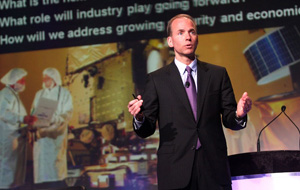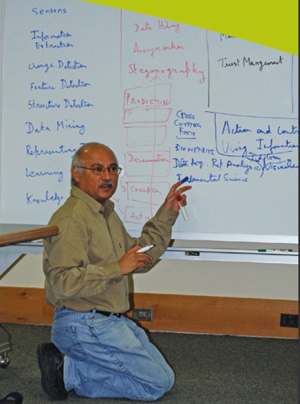The School of Engineering & Applied Science at Washington University in St. Louis will dedicate a new building, Preston M. Green Hall, Friday, Sept. 23, and in conjunction will hold the symposium “Challenges & Opportunities in Engineering Education & Research.”
The symposium, which will feature National Science Foundation Director Subra Suresh, DSc, is open to the public. It will begin at 2:30 p.m. in Room 300 of the Laboratory Sciences building on WUSTL’s Danforth Campus.
In addition to Suresh, other speakers will be Dennis Muilenburg, president and chief executive officer of Boeing Defense, Space & Security and a member of WUSTL’s Board of Trustees, and P.R. Kumar, DSc, professor and College of Engineering chair in computer engineering at Texas A&M University and a WUSTL alumnus.
“We are honored to have such a distinguished panel of symposium speakers that will present on the difficult challenges that our global society faces and the tremendous opportunities that are available as a result of interdisciplinary activity,” says Ralph S. Quatrano, PhD, dean of the School of Engineering & Applied Science.
“Researchers across disciplines realize that the greatest advancements are occurring at the interfaces between engineering and other disciplines, but this interdisciplinary activity among engineers and scientists brings into question how we should teach the engineers of tomorrow.
“These and other topics will be highlighted during the symposium that is being held in conjunction with the dedication of Preston M. Green Hall, our newest building that links and integrates multiple disciplines within engineering,” Quatrano says.
At last year’s meeting of the American Association for the Advancement of Science, Suresh delivered a sobering assessment of America’s current position in the fierce global competition for technological leadership.
“Other nations are investing heavily in science and engineering,” Suresh said. “The U.S. is not the world leader in terms of gross (research and development) expenditure relative to (gross domestic product) … U.S. students are not performing at the top of the charts in international math and science assessments. The demographics of the science and engineering workforce do not match the nation’s changing demographics.
“These are troubling signs that U.S. leadership in science and engineering may be faltering and with it our competitive edge in the global marketplace,” Suresh said.
The only way out, according to Suresh, is through investment in research and education, which offer the best prospect for economic growth, good jobs and a rising standard of living in the future. But that investment is difficult to achieve in a time of high unemployment and budget austerity.

Muilenburg speaking at the Reuters Aerospace and Defense Summit in Washington, D.C., in September 2010.
Muilenburg will discuss how Boeing and other aerospace companies are working with educational institutions to keep the talent pipeline filled with engineering and other technical professionals. “Aerospace, robotics, cybersecurity — these are just a few of the critical need areas for us in an extremely competitive marketplace,” Muilenburg says. “Working with universities on student retention and research projects in these areas, for example, helps build our workforce and strengthens the industry overall.”

Kumar teaching at the University of Illinois at Urbana-Champaign.
A member of the National Academy of Engineering, Kumar is interested in wireless networks, sensor networks and network-embedded control systems — hot topics at the intersection of academia and industry — but he is also an influential teacher who has supervised more than 30 doctoral students.
In a frank talk for graduate students, he once advised them that they should consider an academic job “only if doing research is completely unstressful to you,” warning that they would be required to do “roughly one PhD dissertation-equivalent a year” to maintain an academic position.
The three speeches will be followed by a panel discussion moderated by Janet Holloway, senior vice president and chief of staff at Monsanto, a WUSTL alumna and a member of the School of Engineering & Applied Science’s National Council.
RSVPs for the symposium are requested at engineering.wustl.edu/greenrsvp. The symposium also will be broadcast live on the Internet at engineering.wustl.edu/symposium.